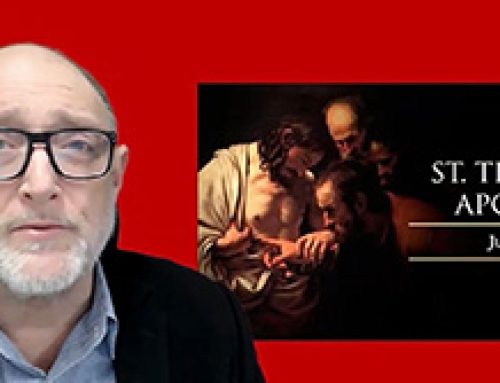Fr Paul Gooley reads today from the Gospel of John (7: 40-52) in which the crowds were divided over who Jesus is – prophet or messiah – Nicodemus speaks up saying ‘Does our law condemn a person without first hearing him and knowing the facts.
Fr Paul says the stubbornness of the opponents of Jesus becomes unmistakable. At first there is still a possibility of mistake, through the mistaken idea that Jesus came from, that is originated in, Galilee rather than Bethlehem. This provoked the sardonic comment about lack of prophets in Galilee. The Galileans were despised in the rabbinic schools of Jerusalem, to the extent that it was said that they could not even speak properly. This may have been a fair comment, or it might have been a gibe born of rivalry between the rabbinic schools in Jerusalem and Tiberias.
Then the hostility mounts, as the leaders reply with sarcasm to the enthusiasm of the agents they had sent to arrest Jesus. This is followed by a further barrage of sarcasm against one of their own number, Nicodemus, who makes the unimpeachable protest that Jesus should at least be given a hearing. So, we have reached the point where no argument is going to shake their hostility.
The controversy whether Jesus was the Messiah (in Greek, the Christ) is understandable. ‘Messiah’ means ‘Anointed’, and the title had strong political overtones, the political overtones of an anointed ruler of the line of David. By some the Messiah was expected to be a glorious warrior who would sweep the Roman occupiers into the sea. For this reason, Jesus himself does not use the title until he is directly challenged by the High Priest.
Jesus’ concept of Messiah was utterly different from that of the Temple authorities.
Jews contemporary to Jesus did not associate with the Messiah the prophecies of the Suffering Servant of the Lord, which was such a strong emphasis in the concept for Jesus himself. This was why Peter’s sudden realisation at Caesarea Philippi that Jesus was the Messiah had to be hushed up, and the disciples were not allowed to start spreading the message until after the crucifixion and Resurrection. It required repeated emphasis from Jesus and the dire experience of the Passion before the disciples came to realise what sort of Messiah he was.
Fr Paul invites us to consider, in Lent, does my stubbornness get in the way of recognising who Jesus really is?






Leave A Comment